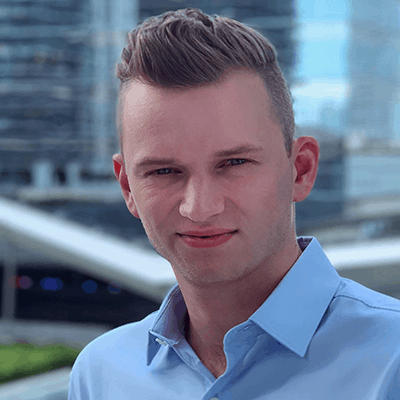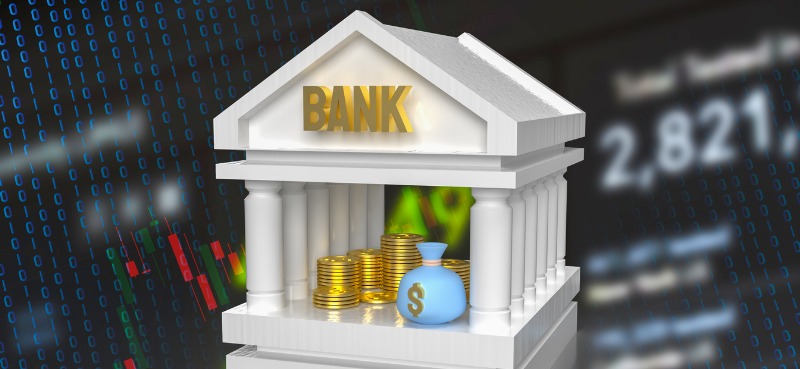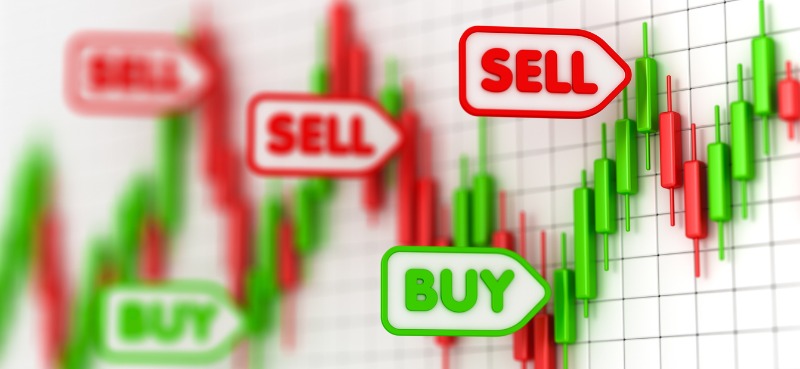On this episode of STO Unplugged, Frank is joined by Kyle Sonlin, cofounder and CEO of token data and financials site Security Token Market. The security token sector has come a long way in the last few years… and both Kyle and Frank have seen more than their share of questionable token investments. Hear why Kyle thinks the sector is improving for the better, and why he’s all in on this exciting new growth market [1:13].
Plus, the biggest risks Kyle and Frank see for the sector in 2020 and beyond… why mainstream security token acceptance is closer than ever… and some sector opportunities Kyle is excited about today [12:55].
It’s all in the newest episode of STO Unplugged.
STO Unplugged | 2
Why 2020 could be the year security tokens go mainstream
Frank Curzio: How’s it going out there? Welcome to the STO Unplugged podcast, where interviews on the biggest names in this incredible growth industry, including CEOs, executives, analysts, and entrepreneurs. Today’s guest is real special. Someone who I admire a lot, knows everything about the security token industry, and when I met him in person for the first time, it’s just a couple of weeks ago, he really blew my mind, and just the dedication, how connected he is to this industry, how many contacts he has. I felt like I was talking to someone who’s going to be one of the biggest names in this industry going forward.
Frank Curzio: I mean, he is now, but wait until this industry really gets bigger and bigger and bigger, which we’re going to talk about in a minute, but his name is Kyle Sonlin, Kyle is the CEO of Security Token Market, which its website is STOmarket.com, one of the only sites you find security tokens that are actually trading on exchanges in the US, along with charts and performance. He’s also the co-host of the Security Token Show podcast along with his partner Herwig Konings, who I interviewed in the past. You know what? Let’s get to my interview with Kyle right now. Kyle Sonlin, thanks so much for joining me on STO Unplugged.
Kyle Sonlin: Thanks a lot, Frank. I’m really happy to be here, I love the podcast and excited to dig into it a little bit.
Frank Curzio: Thanks man. Thanks. So before we dig in some really cool stuff about tokenization, the industry, why don’t you tell us a little about yourself? When did you learn about tokenization, how you got into this industry, and also when did you realize that this is actually what you want to do for your career?
Kyle Sonlin: Absolutely. So my background is in wealth management with equities and so I always knew that I liked the idea of working in the cutting edge of technology and finding out how that simulated into the FinTech space and in the financial industry. So I started by investing and through that, through that opportunity, I learned how companies grow, and then how traditional asset managers and businesses look to leverage their shares and manage shareholders, and that entire asset management process. So looking forward into technology, for me, it was all about finding those efficiencies in the traditional or the opportunities for efficiencies and the new technologies by leveraging them for the traditional financial markets.
Kyle Sonlin: And so I moved into securitization and tokenization as I saw the crypto industry explode, and I saw a lot of the exciting features of blockchain and how that can work with automation to really benefit so many different industries. But I saw that in the crypto space, it just really wasn’t being applied properly. You didn’t have any price anchors, you didn’t have any book value or really any underlying asset that was really going to provide an investible opportunity for the market. And so I moved into the tokenization and securitization space when I realized this. And along with my co-founder, we are trying to put together solutions to help the adoption of taking traditional analog assets and tokenizing to provide for ease of transfer across international jurisdictions, across different firms, and leveraging that moving forward.
Frank Curzio: Now you’ve been doing this for over three years now, which means you’re a veteran in this industry, right? But I want you to talk about the positives when it comes to the changes, and maybe the positive took place in 2019 because to me the industry took a nice step forward is more institutions talking about it, more assets are getting tokenized and we actually have security tokens trading on open markets. But what are some of the positives that you saw in 2019 that make you believe this is going to be or it’s going to go mainstream, be fully developed and everybody’s going to know about this at least over the next couple of years?
Kyle Sonlin: That’s a great question and I think that, that’s sometimes in the technology space, we’re so excited to see things move immediately and to have the immediate change that’s going to blow everything up. And the reality is that with security tokens, what we’ve tried to build as a sustainable infrastructure for traditional finance. And so I think the huge benefits and the huge progress we’ve seen is a lot of the infrastructure support behind the scenes. So there are nine live traded assets and security tokens right now. But the reality is that there’s hundreds of millions of dollars that have been raised and deployed to build the proper infrastructure required for billions, if not trillions of dollars of assets to actually change hands.
Kyle Sonlin: We can’t do this twice, right? Once you create this industry, if we have any issues in terms of a couple of hiccups and stuff, it starts to become an issue. So we wanted to build it sustainably and that’s what we’ve seen over the last two or three years, both in terms of the actual technology that supports asset transfer, that allows for the transparency of the assets and the token holders, and then on top of that, the compliance level. Each individual international jurisdiction has their own standards and requirements for who can participate in security’s markets. And so we’ve needed to build the infrastructure to be able to support that in a way that’s not going to add additional friction to a traditional investor.
Kyle Sonlin: So how can we determine what’s required of you? How can we do that as quickly as possible? And how can we allow that to benefit the entire world in a global financial system. On top of that, I think that the most exciting piece for 2019 has been that we’ve actually seen these live assets. We’ve also seen additional live exchanges. So when I say exchanges, we’re talking about ATS’s, which is Alternative Trading System, and this year in the United States is how the regulation has progressed to actually approve these exchanges to list and exchange these assets to provide that secondary liquidity. So we’re actually seeing real assets changing hands at this point.
Kyle Sonlin: I think that now you’re seeing venture funds, LP interest in venture funds, it’s a very exciting category because that’s something that the traditional venture opportunities is not an exposure that’s available for traditional investors, And now that’s something that we’re seeing trending more and more freely. On top of that real estate funds and many of the others are getting off the ground, they are tokenizing and they’re actually launching, which is exciting to see.
Frank Curzio: Yeah. And there’s hundreds and hundreds, even when you talk securitize of how many security tokens are in the works and coming out, but you just talked about some of the things in 2019, talk about some of the risks, right? Because for me, one of the biggest risks I sees the industry’s liquidity. The Goldman Sachs, Morgan Stanley, these large investment banks, huge institutional investors, they’re not going to come into this market unless there’s liquidity and there’s not right now. And I guess that may start with more regulation or just regulation that’s clear, just like the regulations we have on stock exchanges, right? Because we know when regulation and crypto, those two things don’t mix, but you need to know your money’s safe and everything’s cool. Do you see 2020 being the year this happens, where we’re going to start seeing more liquidity, because when we do and even more regulation, which you touched on a little bit more, which is getting better? It seems like there’s still headwinds here for this thing to go mainstream.
Kyle Sonlin: Absolutely. I think that the key to liquidity is there’s a few things. One being high quality assets and that’s the first piece. If nobody wants to buy the assets that are getting securitized, then you’re not going to see much liquidity. And I think that we’re now starting to see additional great assets as we’ve already touched on, and we can go into that further, that are building and being launched. So that’s the first piece of it. The second piece, I think you mentioned well as the compliance and the regulatory standards by building a common definition for what an investor can participate in, and what jurisdictions are providing the support for this by defining what we’re doing, which is really just digitizing traditional securities.
Kyle Sonlin: We can have interoperability between every international jurisdiction, which then allows the interoperability to have any investor around the world be able to participate in and the same markets together as opposed to today where it’s incredibly fractured in the traditional analog securities exchanges. And then finally the other piece of it is the technology piece that we are continuing to build on and that piece has now been set. We have 60 live exchanges we’re tracking around the world that have either raised capital or launching in 2020 or 2021. So we’re going to be seeing many exchanges getting off the ground, providing liquidity all around the world for many different assets. We’re seeing Ferrari’s getting tokenized in Africa, we’re seeing security funds, we’re seeing analog assets getting tokenized here, we’re seeing a lot of real estate developing internationally in Europe. There’s things going on all around the world and they’re all able to interact together so that it’s not just every man for himself.
Frank Curzio: Yeah, I know, this is so much going on, it’s so cool. That’s why I love having you all on here. And why don’t you talk a little bit, because you’re the CEO of Security Token Market, which is STOmarket.com, really cool site. Talk about that site because, and I mentioned this even before I interviewed you at the beginning, how this is one of the few sites you can go, you can see these tokens trading online, but it’s also a great informational educational site. Talk a little bit more about STO market.com
Kyle Sonlin: Absolutely. So as you mentioned, I’ve been in the space now for three years. And at first when we were working with these deals, helping us on a more consulting basis with a lot of firms, what we’ve found even as experts was that there was no opportunity to do research and due diligence on these deals. And let’s be honest, if you’re an investor or an institution looking to participate, if you can’t do any proper due diligence, it’s never going to work, you’re not going to be participating and it’s something you’re going to sit on the sidelines for. And so with Security Token Market, the goal was to publicize this information and to provide an ecosystem full analysis of all the security tokens worldwide. We’ve got primary offerings in terms of those businesses that are considering a security token offering, or conducting their first fund fundraising round.
Kyle Sonlin: Then we also have the secondary trading portion, which we’re excited about and focusing on now, that has that pricing data of the performing assets on secondary markets that we’re adding API integration to have real-time pricing data. So it’s all about providing that context and transparency on the industry so that anybody can be informed and make the right decisions for themselves. Because as you mentioned, there are risks to investing in any asset, any security, there are risks. You need to do your own research, and if you can’t do your own research, it’s a huge hindrance to the market. So with Security Token Market, we’re really just trying to bring the community forward by providing that level of accountability and transparency in the assets that we’re investing in and participating in the ecosystem.
Frank Curzio: Okay. Speaking of research, you recently wrote a research report about, I believe it’s every security token that you have on your site, which basically traded an open finance tZERO I thought it was fantastic, especially since you’re not going to find any research on these tokens anywhere, at least almost any way, it’s very, very difficult. Talk about that research report a little bit, which can be found. I think it’s for free on your site, right? STOmarket.com.
Kyle Sonlin: Yep. You can find it there, you can also find it through our medium channel, which is where it was posted as a blog. But the goal there for me, it was a very similar mindset. I’ve been logging and tracking with my research team, all of the pricing of all of these assets. And so while we were compiling all this information, we realized that the historical data is not published fully on these live exchanges. They only publish the historical transactions for some of the assets, some there’s full transparency and some it’s relatively opaque. And so we realized that that by compiling all these information and making conclusions off of it, based off of our expertise working in the market, it would help many traditional industry professionals figure out and understand this market and learn it.
Kyle Sonlin: So what we did is we first started out by looking at every live token, there’s nine tokens now. I wanted to do a deep dive on the actual underlying asset because while I love security tokens, it can be very daunting for someone that’s not incredibly familiar with the space. Because not only do you need to evaluate what the specific security is, but you need to evaluate what the underlying asset is because many different assets can pay out in many different ways to investors. And so there’s kind of a two headed beast there. So the first piece of it was identifying exactly what the underlying asset was. We have many funds, as I mentioned before, these are a direct economic LP interests. So if you’re familiar with how a fund structure works, you’re talking about an investor and their interest in that fund as it pays out and their exits.
Kyle Sonlin: You also have some revenue share tokens whereas a company makes revenue, some of that percentage gets distributed out to the bottom line. And we also have real estate tokens where you have a real estate property that pays out dividends based off of the rental income of the property. You also have economic interest in the equity of the home. So as the home increases in value, you actually increase in value as well as a shareholder of that home, but you also get paid in that dividend of rental income. So I did a full analysis on each one of those tokens as well as then… And then analyzing how it performed on secondary markets over the last 12 months.
Frank Curzio: Now when I look at your report and dug into these security tokens, your report didn’t but it kind of pissed me off that there wasn’t more transparency. I mean you don’t get transparency with utility tokens, right? Where these companies are offshore, you don’t know their financials, how much cash out of the balance sheet, how many customers they have actually used to the utility, which is the sole purpose of investing in those utility tokens, right? The utility, right? And because you get no equity, I bet you probably 60, 70% investors don’t know that when investing in those cryptos. So the reason why you would do a security token, because more regulations because your company’s real, more transparent, show you numbers of progress with investors, yet when I see even through your research report and when talking to you, I still have no idea with some of what the actual security token represents.
Frank Curzio: As an investor, I want to know what this, so what does a token entitle me to? And if we take an example of lottery.com it says this token offers investors 7% of that revenue of on the plan and global impact raffle, right? So that is global impact raffle and they’re going to share 7% of net revenues are probably played out the dividend. I can’t find any information if that even exists. I mean is it planned? Is it still happening? How much net revenue are they generating? When do they plan to launch this? I mean how when I look at this without this information, nobody is going to invest in this token which makes the public, and when I say the public that people who are not like you and I who are familiar with tokenization, right?
Frank Curzio: These are non-tokenization people learning about the industry for the first time and we’re trying to excite them, but it makes them extremely skeptical and they may look at this as being no different than the typical utility token where some of these companies raised millions, you don’t even know what that money is, yet their tokens crashed 90% plus. Was that a frustration for you? For me it was and, I got to be honest with you, it pissed me off because I want to invest in these, I have investors that are interested in here, but if I can’t find anything about your token, even if it’s security token, I can’t invest it. I can’t tell people to invest in your company.
Kyle Sonlin: It’s incredibly frustrating, and I totally share that same sentiment. I think that what we’ve seen is that the space has developed tremendously since 2017, 2018, but unfortunately, a lot of the early transition to security tokens does root a lot in the crypto scene. And we’ve worked very, very hard at Security Token Market and Security Token Group to push forward the idea of defining a security token as the rights to an underlying asset and creating an ecosystem around transparency. Because as you’ve mentioned, no one’s going to invest in these things, if you’re not being fully disclosing what they’re actually able to participate in. And if you’re offering a legitimate security, if you’re selling something that’s real, and you’re excited about and both sides are going to be successful because the investor is going to get returns over time and you’re going to get your capital up front.
Kyle Sonlin: If you’re an issuer, as we work with issuers a lot, you should absolutely be transparent because it only benefits you as an issuer to be more upfront about the asset that you’re selling. It’s how traditional markets work, it’s how the future of the markets will work and it’s something that we need to continue building towards and so, by having reports like mindful as podcasts like yours where we continue to push out these positive messages, I think is very important and crucial to the industry. Since then, it’s 2019, 2020, and we’ve seen a tremendous increase in the peripherals and collateral that are being distributed. I think that the key here, and back to what you were mentioning about whether 2020 or 2021 can be that adoption period, what we’re seeing a lot is there’s a lot of successful security tokens that have raised capital already. But because of regulation, there’s a lockup period on one of those tokens can go live. So the investors have to hold that token, or it’s frozen for 12 months following that close of the investment. And so that’s what we’re still waiting on to see many of these even more exciting assets launch and go live.
Frank Curzio: And one of those exciting assets, which I know that you know about is the Brooklyn Nets star, right? So he turned his… you know, Spencer Dinwiddie. So he tokenized a portion of his contract. Explain that for people who may be again, are learning about this industry for the first time and say, okay, I get it’s fractional ownership, but for him to do this, what I like about this industry, and this is a good example because one, it’s public. People are familiar with basketball, people know the superstar, but it’s not just a benefit to, “Hey, it’s a good, good for investors.” It’s good for the person, for being able to sell a portion of their asset. But something like this, I see going more mainstream. And we talked about this in person too, but maybe if you could talk a little bit about that, and how that works and it gives people a better perspective of why you and I are talking about this industry and why was so excited and why it makes so much sense.
Kyle Sonlin: Absolutely. It’s an incredibly fascinating asset. And so essentially as you mentioned, Brooklyn Nets star, Spencer Dinwiddie has a $34 million contract. And in the NBA, contracts are fully guaranteed. So no matter what an injury happens, no matter anything that happens, he’s entitled to that full 34 million. It’s in paid over three year installments of around 11 million each, with some change on each one of those years. And so essentially what Spencer Dinwiddie said is, “Okay, what I really have here is a coupon paying bond.” That’s nothing new, we were familiar with these in traditional markets and essentially it’s a coupon bond where you’re getting paid 11 million in coupons per year over three years. And so what he did is said, “Look, I’d rather get my money upfront and then payback investors and interest rate over time when my contract pays out in each of the subsequent years.”
Kyle Sonlin: So he sold 40% of his NBA contract for, I think it was 13 and a half million upfront or something like that, and then provided investors with a 5% interest rate per year on that security token. So they get 40% of his contract as well as an additional 5% per year, which when you’re talking about a fixed income security is not bad. You’re looking at something that’s a fully guaranteed contract, the void rate on NBA contracts is so incredibly low that it’s a very low risk opportunity, just from a risk management standpoint. Again, this is not an investment advice, but it’s an fascinating contract where he tokenized 40% to get that money up front, because for him, it was more important to have some money up front and then over time investors get a great fixed rate in return as well.
Frank Curzio: That’s just one idea, right? That just came out. We’ve seen numerous, what are some of the things I got to put you on the spot here, that are exciting that you’re seeing, because you talked about real estate, you’re talking about fixed income. This is a 5% interest rate, again, on a guaranteed contract, right? I mean if you could find an investment asset or a class that generated 5% risk free returns, you’ll get $1 trillion into it immediately, right? Because that’s what happened with the housing, these fake AAA ratings and the whole entire world is in them, they’re safe, we’re getting good rates. So something like this makes sense for everybody involved. What is some of the other things that you saw that exciting because I think I heard you talk about a little bit on your security token show podcast, with Herwig who I’ve interviewed on this podcast before, who is your partner, talk about some of the things that you guys are seeing that that has you excited?
Kyle Sonlin: Well I’ll tell you something that we’re really excited about and these are actually live already on STO market. You can see that, you can also read about them in the report if you want to know more, is the real estate side of it. And so what you’re talking about is you’re talking about an LLC that owns a full real estate property and then you’re dividing that into a thousand shares and those shares are just owned by the people. So when you’re talking about a token, don’t get confused if you’re new to this industry, it’s really we’re just talking about a share of a home that then gets paid daily dividends of 11 to 13% per year on the rental income. So you own your equity in your house, and then on top of that you also get a double digit percent return paid daily into your bank account.
Kyle Sonlin: I think that that’s another fascinating use case and one that we’re going to see explode. They’ve already listed three, I think they’ve got seven more in the pipeline with just one instrument platform that seems to be a leader in this space. We also see hundreds of millions of dollars of real estate that is getting tokenized in the UK as well. So I love the real estate use case a lot. I like equities as well, but the problem is that we’re seeing a lot of security token issuers that are startups without cash flow. And so they’re not making much money and then they’re trying to launch a token that makes it very difficult to value. Whether they offer some kind of dividend or something like that is fantastic, but when they’re not making a lot of money, it gets difficult.
Kyle Sonlin: So the late stage businesses that are looking to scale for growth capital is also a very exciting use case because we’ve seen restaurant chains that have 120 locations and are really successful, that are looking to tokenize to raise another two or 3 million because they don’t have traditional access to capital, and they want to scale to open more restaurants. They’re going to be paying dividends because they’ve got predictable financials, they’ve got predictable customer base and a very strong brand and then they’re launching that token to raise capital. And I think that that’s a fantastic use case as well, is that growth capital for businesses that aren’t necessarily maybe the most trendy in traditional markets, that are just looking for a line of capital, access to cash and investors want to participant in these industries because they can be tremendous returns, can be very reliable and successful investments.
Kyle Sonlin: And it’s just one that you wouldn’t necessarily have access to, whether it’s late stage businesses, whether it’s real estate or even whether it’s, we’ve seen film where they’re crowdfunding movies, and so you get a percentage of the box office and how that thing performs over time in the markets, like the Avengers movie that does whatever billions of dollars, that’s not what their budget was. So you could participate and be an early investor in a film that either you are particularly excited about or think is going to be the future. And then as that thing performs over time in markets, then an investor could get that return and it’s just an asset that wasn’t previously accessible to the traditional public.
Frank Curzio: Yeah. And for everyone out there learning about this industry for the first time, and this is our second podcast, we’re trying to bring tokenization and security tokens to mainstream and educate people. So what Kyle was talking about is if it’s a restaurant that owns a hundred plus places, that’s an illiquid asset. Real estate is a lot, and if you look at real estate, we’re looking at, I think it’s like $17 trillion in real estate assets we have around the world, probably even more than that. But a lot of that is illiquid, and same with the fixed debt market. If you look at the Goldman Sachs and you look at the JP Morgan’s and Morgan Stanley’s just look at their quarterly earnings. The most money they make is on a fixed income division because it’s illiquid and they could charge whatever.
Frank Curzio: So a lot of these people in these industries are looking for other ways to tokenize their assets or to sell a piece of their company. Now, why does that make sense? Kyle like you mentioned, you’re selling off a piece of your company for money right now, which makes sense for the people who are doing it, and for investors, you’re getting an equity stake a lot of times in establish very small companies that can grow into four or 500 maybe 700 a thousand stores a year getting an equity stake in this compared to utility tokens. But when you look at it and you look at the fees involved, it’s just an industry that makes sense. And I know that you’d been advocating this for a while, Kyle, and just seeing so much that’s going on, being able to meet you and talk to you in person, I mean I can see how excited you are about the industry, especially going into this year and going forward. Aren’t you?
Kyle Sonlin: absolutely. I’m just excited to see capital markets expand. I’m most excited about the fact that we also have international interoperability, and that’s just a big way of saying that everyone can participate in the same market. In today’s day and age, it makes no sense to have national stock markets that hinder international investors from participating. Even for an example of the other way, me investing in a share of Samsung stock through the South Koreans stock market is not quite as easy as it really should be as a large company like that. And that’s because we have jurisdictional based exchanges for these assets. This should be a global financial market where anybody can be participating, anybody can be investing in any asset that they find and they to participate in. And so we’re really just building equality for the financial markets by leveraging technology, because before we didn’t have the ability to trust that we could make this thing happen sustainably over time. But now with the blockchain, with tokenization of assets and by building global standards and definitions for these things, we can all follow the same rules and we can all trust each other to buy and sell assets.
Frank Curzio: Yeah. Well said. Well Kyle, listen, we covered a lot today, which is great and I really appreciate it. And if someone wants to learn more about you, your company, how can they do that?
Kyle Sonlin: Well, you can go to STOmarket.com as we’ve mentioned before, there’s live pricing data as well as a lot of information on all of these securities, but I also, I’m very active on Twitter, I’m always posting things that I’m seeing exciting news as well as thought leadership. So if you’re interested, definitely go check that out as well for maybe some short form stuff. And then finally we have Medium, if you know medium.com, we have Security Token Group and we have a publication where we post plenty of longer form research articles there as well.
Frank Curzio: All right Kyle, well thanks for taking the time. I know how busy you are and how much you travel, really great, thank you so much for coming on the podcast, I really appreciate it buddy.
Kyle Sonlin: Thanks so much for having me, Frank. I really appreciate it.
Frank Curzio: Hey guys, great stuff from Kyle, the cool guy, very smart, said early, how he blew me away when I met with him along with his partner Herwig Konings. Just the dedication, the excitement, the hoard work, it was really cool to see and just the connections that they have in the industry, and for me, being in this industry, launch it on home security token. A lot of people are starting to come to me personally because I’ve been doing this for 25 years. I don’t know if you’ve just listened to this from as a security token person, but I have my Wall Street Unplugged podcast where I’ve been covering stocks, been an analyst for over 25 years. I followed my late dad’s footsteps who did that 30 years, so basically been in financial industry my entire life working for Jim Kramer and just having great mentors along the way for me to start my career research company.
Frank Curzio: Then when I looked at Security Token Market, I said this market is absolutely amazing. It’s going to happen, it’s just a matter of time. And I believe in it so much that we launched our Curzio Equity Owners Token. And since we launched that, and this is going to be available to the public, we launched it where we raised $4 million for investors, and now in July it’s going to be free trading. So since we launched that, so many companies are coming to me looking to do the same thing because I mentioned this early in my interview with Kyle, how if you’re looking at the quarterly results, look at the last quota results about 40% S&P 500 companies reporting so far for this earning season but a couple of weeks ago you had the banks reporting. Look at their fixed income segments, look how much money they generate, because when you do, you’re going to see it’s an illiquid market that, I don’t want to say almost rob people, but it’s just amazing amount of fees a generate.
Frank Curzio: So now you have the fixed income market saying, how could we know do this without so much fees and you’re seeing it come, when it comes to tokenization and you also seeing it in real estate, we’re talking about trillions in assets. And when people think security tokens is not a token in your hand, just like it’s not a share in your hand, when you own a share stock. It’s a digital security, similar to shares of a stock where you own it through an account, and so this way, while it can be trading on exchanges, but you want that whole entire industry to be regulated to the point where you know where your money is, it is safe, it is insured. That’s where this industry is going, that’s why I believe in a security token industry, it just makes sense from every point of view. When I look at the financial industry, especially investment banking, it’s one of the few industries I know of that hasn’t been disrupted in over a hundred years.
Frank Curzio: Yes, You’re going to say, well, there’s algorithms, 5G things getting faster. Yes, that part, I’m talking about the investment fees where you need investment banks to go to. I have a lot of friends who work in investment banks, a lot of them are brilliant, I read a lot of these reports, I’m not picking on them, but what they are in this industry is middlemen. So they say, “Hey, you want to raise money? Okay, we know all these people, here we go, how much you want to raise? $100 million? Okay, give us 6%, and 6% of the shares. We’ll provide markets for you.” When it comes to fixed income, we’re going up front, but it’s not a lot of people in this industry that industry has incredibly, incredibly high barriers. Even if you want to start a hedge fund, you have to probably have about 200, 250 million just to break even with costs.
Frank Curzio: Sounds like a lot of money, but the fees you generate are not going to be that much, especially now, you can only charge 2% 20%. So, when you look at that industry, believe me that Goldman Sachs, the Morgan Stanley, JP Morgan’s, they’re all aware of what’s going on in tokenization. They’re ready to launch, but they can’t right now because you need more regulation. The SEC is working on that, but you’re seeing more and more assets get tokenized and this industry is getting bigger and bigger and being here at the beginning, at the very early stages is just really cool because really you can go any way you want. So if anyone’s interested and learning more about this issue, please contact me, frank@curzioresearch.com. I’ve had dozens of companies reach out to me that raised money in the public markets before that are looking to it to tokenization. It’s not an easy process, it’s easy if you know the right people. I’ll show you how to do it since we’ve been through this process, we’re one of the few companies in the world that’s been through this process.
Frank Curzio: And I could tell you something, I know companies who didn’t go my route, it used different lawyers, structured it differently and got in a lot of trouble, a lot of trouble, so you have to know the right way to do that. If you have any questions, comments, feel free, email frank@curzioresearch.com and help a lot of companies learn about this, pointing them in the right directions of the people that we used that allowed our token to go very, very smoothly and launch our token very, very smoothly. But it doesn’t always happen that way if you use the wrong people, especially you have great lawyers on Wall Street that don’t understand crypto, you have great lawyers on crypto that don’t understand Wall Street. You need somebody that understands both and believe me, that’s not easy to find. We find the right people for that, we know the right people for that, but if you need help with this, again, feel free to email us at frankcurzioresearch.com.
Frank Curzio: So guys, you can find this podcast on iTunes. You may be listening through iTunes. If now you may be listening to our website, which you can also find at frank@curzioresearch.com. More specifically, we’ll go to our token tracker site where we publish all in developments in SEO industry every single week. We send these stories directly to your email, so to sign up, just go to www.thetokentracker.com, that’s www.thetokentracker.com, it’s absolutely free. You sign up, you’re going to get this sent to your email, all the stories, I see a lot of great things going on. Not too many people are covering this, but it’s going more and more mainstream. This is the easiest way to get the up-to-date news that you need and see the growth that’s taking place in this amazing industry. Also, I plan to have at least one interview on STO podcasts at least one per month. If you’re on a mailing list, we sent you an email the minute it publishes. If you have any comments, questions, feel free to email me directly again at frank@curzioresearch.com. So guys, thanks so much for listening, and that’s it for me and I’ll see you guys in 30 days. Take care.
Announcer: Frank Curzio is the CEO and founder of Curzio Research. All opinions expressed by podcast participants are solely their own opinions and does not reflect the opinion of Curzio Research or its affiliates. To read more about our private policy and disclaimers, visit www.curzioresearch.com.





















